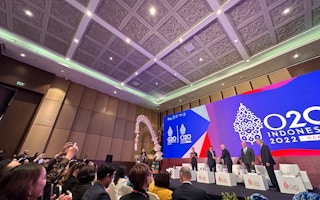The government of Indonesia has forged an ocean conservation and market development agreement with the World Economic Forum (WEF).
To continue reading, subscribe to Eco‑Business.
There's something for everyone. We offer a range of subscription plans.
- Access our stories and receive our Insights Weekly newsletter with the free EB Member plan.
- Unlock unlimited access to our content and archive with EB Circle.
- Publish your content with EB Premium.
Announced on Monday at Oceans 20 (O20), a side event devoted to the oceans at the G20 Summit in Bali, the public-private platform aims to stop the decline in ocean health as well as explore ways to develop the blue economy.
The initiative is designed to promote sustainable ocean economy growth by encouraging G20 economies to fast-track financing schemes to promote ocean health and address marine threats such as plastic pollution and climate change.
As host nation of this year’s G20, Indonesia will be the first country to curate the O20. Archipelagic Indonesia is the world’s fourth biggest carbon emitter and second largest source of marine plastic pollution.
The G20 club of the world’s wealthiest 20 countries represents 45 per cent of the world’s coastlines, 80 per cent of global carbon emissions and 75 per cent of global trade.
The agreement was announced on a panel featuring Klaus Schwab, WEF’s founder and executive chairman, and Luhut Binsar Pandjaitan, the Indonesian government’s coordinating minister of maritime and investment affairs.
In parallel to the announcement, WEF launched a study by Boston Consulting Group, which finds that goods and services provided by the ocean are worth US$2.5 trillion a year, equivalent to the world’s seventh biggest economy.
The report highlighted how more than half of the world’s oxygen is produced by the ocean, which provides nutrition for billions of people, and is pivotal to industries such as fishing, logistics, transport and tourism.
Speaking at the O20 launch, Peter Thomson, United Nations secretary-general’s special envoy for the ocean, said that Sustainable Development Goal (SDG) 14 – life below water – had been an “unwanted goal” when the UN’s sustainability targets were drawn up after the signing of the Paris Agreement in 2015.
“There was a plan [in 2015] to reduce the number of SDGs – and SDG14 was the first on the chopping board,” he said.
As a Fijian, Thomson said that ocean health was critical to his country’s future. “We know that life wouldn’t exist without the ocean,” he said.
Also at O20, the Indonesian government announced an agreement with Green Climate Fund, a Seoul-based fund that helps developing countries take climate action, and non-profits Conservation International and Konservasi Indonesia, to raise US$30 billion in capital to support SDG-linked projects.
Named the Blue Halo S initiative, the scheme aims to combine two elements of marine management often seen as being at odds: environmental protection and economic production.










